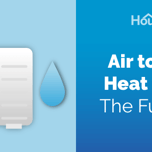Answer these simple questions and we will find you the BEST prices
Which type of solar quotes do you need?
It only takes 30 seconds
100% free with no obligation

Get up to 4 quotes by filling in only 1 quick form

Install a heat pump for less with the BUS grant

Increase the value of your home by installing a heat pump
- Householdquotes.co.uk
- Heat Pumps
Heat Pumps for Your Household: The Complete Guide 2025

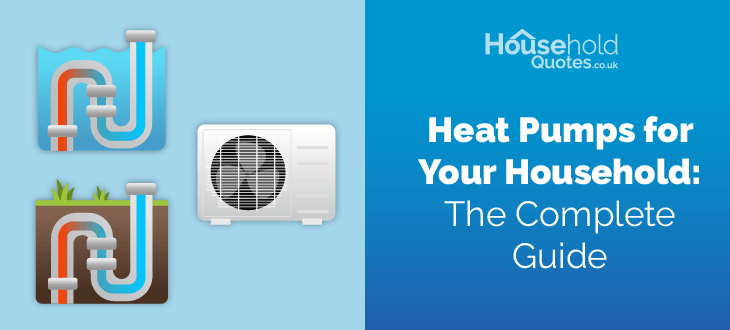
- Heat pumps in the UK can allow homeowners to save up to £2,300 a year on their energy bills by installing an air source or ground source heat pump for example.
- Ground source, air source, and water source heat pumps offer versatile cooling and heating solutions for residential use throughout the year.
- Take advantage of the Boiler Upgrade Scheme and save up to £7,500 on your heat pump installation.
Heat pumps, which provide both heating and cooling throughout the year, present a valuable opportunity for homeowners to embrace highly efficient and environmentally friendly heating systems. Supported by initiatives like the Boiler Upgrade Scheme, heat pumps offer a wide range of benefits as the UK strives for carbon neutrality by 2050.
By reading our comprehensive guide, you will gain the necessary insight into the ins and outs of how heat pumps work, explore the different types, assess costs and efficiency, and delve into their advantages and disadvantages to make an informed decision.
Has this sparked your interest in heat pumps? Fear not, as here at HouseHold Quotes our goal is to offer exceptional support. Click the button below to easily get up to 4 quotes from top local installers, saving hours of your time and ensuring the best options. Our quotes are free with no obligations, providing you with prompt service without the hassle of calling and comparing installers yourself.
- Quotes from local installers
- Payment by finance available
- Save £7,500 with BUS grant
It only takes 30 seconds

What is a heat pump and why should I have one in my household?
A heat pump is a versatile system that efficiently transfers heat between locations using a compressor and a circulating refrigerant. They offer warmth in winter, and coolness in summer, and help reduce energy costs on your utility bills.
How does a heat pump work?
Still in doubt about how heat pumps work? The heat pump diagram below offers a visual explanation of their operation. Moreover, here is a detailed breakdown of how heat pumps function:
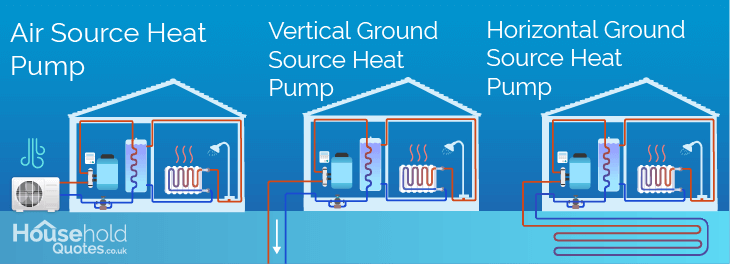
- Absorption and evaporation: Heat pumps transfer heat from the air, ground or water (depending on the type of heat pump) and move it to a heat exchanger that contains liquid refrigerant. This refrigerant absorbs the heat from the outside and turns it into a low-pressure, low-temperature gas.
- Compression: This gas is then transferred to an electrically powered compressor that compresses the refrigerant, increasing its pressure and temperature. This compressed gas then moves to a heat exchanger where it transfers heat to a cold water circuit, causing the water to heat up as it absorbs the heat from the gas.
- Condensation: Once the water reaches the desired temperature, typically around 55 degrees, it is directed to your home's radiators and underfloor heating system to warm your house. This heat transfer process cools the refrigerant sufficiently to turn it back into a liquid.
- Continuous cycle: After condensation, the cooled refrigerant passes through an expansion valve, which reduces its pressure and allows it to absorb more heat energy. The refrigerant is then pumped back into the heat exchanger to repeat the cycle of heating and cooling, ensuring efficient operation of the system.
If you're considering why you should have a heat pump for your home, the answer lies in their versatility and sustainability.
When combined with renewable energy sources like solar panels, heat pumps (be it air, ground, or water-based) offer a comprehensive solution for UK homes year-round. In the following sections, we will delve into the pros and cons of heat pumps, explore the available types, and provide you with the knowledge needed to make an informed decision.
What types of heat pumps are there?
Having explained how heat pumps work, it is also important to understand the different types of heat pumps: air source heat pumps, ground source heat pumps and water source heat pumps.
Air source heat pumps absorb the warmth from outdoor air, distinguishing them from ground and water systems. This heat pump system transfers this warmth indoors for heating and hot water, with the ability to provide cooling as well. However, unlike ground source heat pumps, their efficiency wanes as temperatures drop (read more about the best air source heat pumps).
Ground source heat pumps, on the other hand, utilise the earth's solar energy absorption for stable heating throughout the whole year, while water source heat pumps efficiently transfer heat from water sources.
Water source heat pumps also boast high efficiency ratings even in cold conditions compared to air source heat pumps. If your energy needs are high, you can also combine air source heat pumps with solar panels.
Learn about air to water heat pumps.
How much do heat pumps cost?
When considering a residential heat pump, cost is a common concern. Heat pumps, particularly ground source ones, can be costly, typically ranging from £16,200 to £31,000 but potentially reaching up to £50,000 for vertical ground source heat pump borehole installations.
In comparison, air source heat pump costs are more budget-friendly, with costs usually starting from £7,000 and going up to £20,000. If you're keen to replace a boiler with a heat pump, you can also take advantage of grants like the Boiler Upgrade Scheme, which can help offset these high upfront costs. The running costs of heat pumps in the UK vary based on factors such as household insulation properties and size.
To give you a greater understanding of the costs related to heat pump installation, below we have compiled a breakdown of the different types of heat pumps and their costs:
| Heat pump costs overview | ||
|---|---|---|
| Heat pump type | Costs (supply and installation) | Average running costs |
| Air source | £7,000 – £20,000 | £685 to £1,235 |
| Ground source | £16,200 – £50,000 | £455 – £1,185 |
| Water source | £6,000 – £11,000 | £1,300–£1,700 |
These are approximate costs. The price of a heat pump will vary on factors such as the type you choose, its size, efficiency and the brand. If you need a more precise estimate for your specific needs, avoid the hassle of spending hours of your time searching for an installer by using our free and non-binding service.
Complete our 30-second form, connect with up to 4 nearby installers, and compare quotes to ensure you get the best deal – all for free and with no obligations. Start now by clicking below.
- Quotes from local installers
- Payment by finance available
- Save £7,500 with BUS grant
It only takes 30 seconds

How efficient are heat pumps?
The energy efficiency of heat pumps stands out with ground source heat pumps reaching efficiency ratings of up to 400%. Moreover, heat pumps showcase higher efficiency ratings compared to more traditional heating systems such as gas boilers or electric heaters.
Furthermore, boilers can offer up to 92-100% efficiency, and electric heaters are theoretically 100% efficient.
| Heat pump efficiency overview | |
|---|---|
| Heating system | Efficiency |
| Heat pump | 300 - 400% |
| Boiler | 99-100% |
| Electric heater | 100% |
Are heat pumps worth it?
Heat pumps are well known for their exceptional energy efficiency, with ratings reaching 300 to 400%, offering efficient heating and cooling capabilities as needed. However, they can come with a significant price tag, especially vertical ground source heat pump installations, which can cost up to £50,000. Despite the high initial costs, there are various heat pump grants available to help offset expenses, such as the Boiler Upgrade Scheme.
| Potential savings with a heat pump for different house sizes | ||||
|---|---|---|---|---|
| House size | Heat pump size (kW) | Energy needed (kWh) per year | Yearly savings | Break-even point (years) |
| 2 bedrooms | 8 | 7,312.5 | £80 – £385 | 7-14 |
| 3 bedrooms | 12 | 11,212.5 | £65 – £530 | 7-14 |
| 4 bedrooms | 16 | 16,575 | £45 – £735 | 7-14 |
The figures given above are mere estimates and the savings or repayment time are subject to change depending on your circumstances. Nevertheless, with high-efficiency ratings and numerous grants available, it’s almost certain that heat pumps are well worth the investment in the long term.
Save yourself hours of time and effort spent researching and comparing local installers by yourself. Instead, choose the easy way by taking advantage of our free and non-binding service, connecting you with up to 4 qualified local installers hassle-free. Click the button below to get started:
- Quotes from local installers
- Payment by finance available
- Save £7,500 with BUS grant
It only takes 30 seconds

What are the pros and cons of a heat pump?
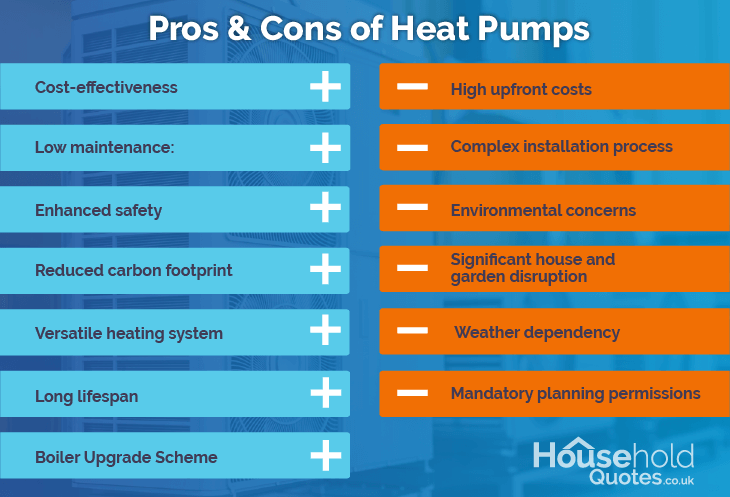
In the upcoming section, we will explore the pros and cons of heat pumps in the UK to assist you in deciding whether a heat pump is the right choice for you compared to other heating systems.
Advantages of heat pumps
The benefits of heat pumps go beyond high-efficiency ratings and eco-friendliness. Below are some of the numerous benefits of installing a heat pump:
- Cost-effective operation: Heat pumps offer potential annual savings of up to £2,300 compared to combustion-based systems, despite initial costs.
- Low maintenance: Minimal maintenance is required, with homeowner checks annually and professional inspections every 3 to 5 years.
- Enhanced safety: Heat pumps are safer than combustion systems as they do not rely on burning fuel for heat.
- Reduced carbon footprint: Highly efficient in converting energy into heat, significantly reducing carbon emissions with some models achieving nearly 400% efficiency.
- Cooling capability: Can function as air conditioning units during hot weather, especially air to air heat pumps.
- Longevity: The lifespan of a heat pump is approximately 15-20 years.
- Boiler Upgrade Scheme: This scheme offers financial incentives up to £7,500 for air source and ground source heat pumps, promoting low-carbon heating adoption and making air source heat pump installations cost equivalent to new boilers.
Disadvantages of heat pumps
Nonetheless, the installation of heat pumps does have its downsides. Here are some of the primary disadvantages associated with heat pumps:
- High upfront costs: While it’s true that heat pumps offer long-term energy bill savings and reduced carbon emissions, the initial investment can range from £7,000 to £50,000.
- Complex installation process: Installing heat pumps involves detailed planning that considers factors such as heat movement, local geology, and specific heating/cooling requirements.
- Environmental concerns: While heat pumps contribute to lower carbon emissions, they are not entirely carbon-neutral due to electricity usage and the environmental impact of some heat transfer fluids. Using biodegradable fluids or renewable energy sources like solar power can help achieve greater carbon neutrality.
- Significant house and garden disruption: The installation of heat pumps may require penetrating building cladding, potentially causing inconvenience and disruption to the property and surrounding landscape.
- Weather dependency: Cold weather conditions can challenge the efficiency of heat pumps, with issues like icing affecting air source heat pumps and ground source heat pumps performing better in low temperatures.
- Mandatory planning permissions: Special planning permissions are necessary in Wales and Northern Ireland, while requirements in England and Scotland depend on property size and location.
Can you install a heat pump in your household?
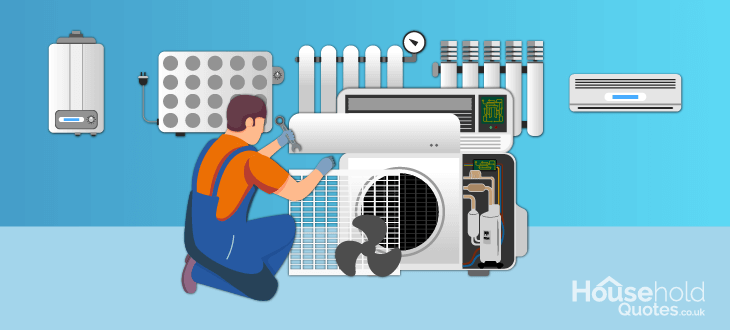
When considering heat pump technology for your household, factors such as the type of heat pump system you end up choosing and your home's insulation play a crucial role.
For instance, ground source heat pumps are more complex to install compared to air source heat pumps. This is due to their space requirements and intricate installation process, especially in the case of vertical installations.
Another option to consider is the water source heat pump. Although not as common due to installation complexities, it can be a viable choice if a water source is readily available nearby. However, if the water source is too far away, the energy required to pump the water to the heat pump may negatively impact the system's overall efficiency.
For smaller households or simplicity, air source heat pumps are a more practical choice. Understanding how heat pumps work and the specific needs of your property can help determine the most suitable option for efficient heating and cooling.
Additionally, proper insulation is crucial for heat pump efficiency, as poor insulation may require a larger, costlier heat pump.
Is a heat pump the right choice for your household?
Ultimately, no matter what heat pump you choose or how well-insulated your home is, it’s always highly recommended to seek professional guidance for tailored advice on your household’s needs.
Instead of going through the unnecessary time-consuming hassle of spending hours searching for and calling multiple installers for expert advice, you can instead choose the easy way and take advantage of our free and non-binding service.
By simply clicking on the button below and filling out our short 30-second form, we can connect you with up to 4 vetted heat pump installers completely hassle-free.
- Quotes from local installers
- Payment by finance available
- Save £7,500 with BUS grant
It only takes 30 seconds

FAQ
Heat pumps can provide both heating and cooling for a whole house. A larger house will typically need a larger heat pump to effectively heat and cool the whole space.
Heat pumps are generally more efficient than central heating systems, especially in moderate climates. Heat pumps can achieve impressive efficiency ratings of up to 400%. In comparison, central heating systems typically have a COP of around 98%
Yes, heat pumps work in the UK’s cold weather. Ground-source heat pumps harness the Earth’s warmth, remaining efficient in cold weather. Air-source heat pumps may lose some efficiency in the cold but can still operate unless they reach their minimum temperature.
The electricity usage of a heat pump is influenced by factors such as its size, efficiency, operating environment, and the local climate. For an accurate assessment, it is advisable to seek guidance from a professional installer specialising in heat pumps.

Alejandro, a copywriter at Household Quotes with a background in law and content creation, is passionate about sustainable and affordable home improvements, and how the EU is adapting its policies to combat climate change.
- Heat Pumps for Your Household: The Complete Guide 2025
- What is a heat pump and why should I have one in my household?
- What types of heat pumps are there?
- How much do heat pumps cost?
- What are the pros and cons of a heat pump?
- Can you install a heat pump in your household?
- Is a heat pump the right choice for your household?
- FAQ


